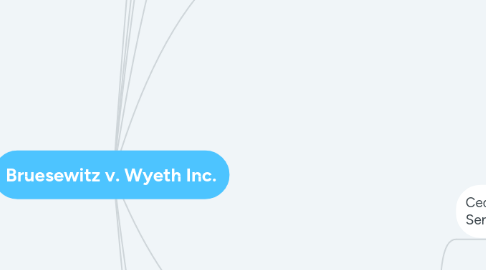
1. Facts
1.1. Parties
1.1.1. Bruesewitz
1.1.2. Wyeth Inc.
1.2. What Happened
1.2.1. 6-month-old Hannah Bruesewitz was administered a dose of DTP vaccine according to the CDC's recommended childhood immunization schedule.
1.2.2. Hannah Bruesewitz began experiencing seizures within 24 hours of taking the DTP vaccine.
1.2.2.1. She continued suffering from more than one hundred seizures during the next month.
1.2.3. Hannah Bruesewitz continued to suffer from residual seizure disorder that requires her to receive constant care.
1.3. Procedural History
1.3.1. Parents of Hannah Bruesewitz filed petition to seek compensation for her injuries.
1.3.1.1. Their petition was dismissed because they could not prove there was a link between Hannah's seizures and the vaccine.
1.3.1.1.1. Bruesewitz brought the case to the Pennsylvania state court, before it was moved to a federal district court, which ruled that the National Childhood Injury Act protected Wyeth from the lawsuit for claims against vaccine damages.
2. Issue
2.1. Does the National Childhood Vaccine Injury Act protect vaccine manufacturers from tort actions filed in court by alleged victims of vaccines who seek compensation for injuries that may have resulted from the provided vaccine?
3. Rule of Law
3.1. Special Vaccine Court was established as a means to provide compensation to injured children without de-incentivizing drug manufacturers from competing in the vaccine market.
4. Application
4.1. Plaintiffs claimed the purpose of the National Childhood Vaccine Injury Act was to:
4.1.1. Promote vaccine safety. Offering vaccine manufacturers blanket defense against claims will:
4.1.1.1. Reduce R&D budgets
4.1.1.2. Negatively affect vaccine safety
4.1.1.3. Slow down improvements made to vaccines
4.1.2. Ensure fair compensation for injuries caused by the vaccine
4.2. Defendant, Wyeth Inc. countered that the purpose of the National Childhood Vaccine Injury Act was to:
4.2.1. Protect vaccine manufacturers from lawsuits resulting from claims for damages against alleged side-effects of vaccines.
4.2.1.1. NCVIA also recognizes that statistically, the overall public benefit of distributing vaccines significantly outweighs the number of side-effects experienced few users
5. Conclusion
5.1. The US Supreme Court (6-2 majority opinion) affirmed the lower court decision.
5.1.1. Vaccine manufacturers are not liable for vaccine-caused injuries or fatalities if they provide proper directions and warnings.
6. Impact
6.1. Cedillo v. Sec. of Health and Human Services
6.1.1. Plaintiffs argued the following points to demonstrate that Michelle Cedillo was developmentally normal before receiving the vaccine:
6.1.1.1. Cedillo and other children suffered from "mercury efflux disorder," which evidence was presented to link the common symptoms to the vaccine.
6.1.1.2. The vaccine had caused intestinal damage, as witnessed by gastroenterologist.
6.1.1.3. A study showed that there was a presence of vaccine-strain measles virus in the GI tract of children with autism.
6.1.2. HHS argued that Michelle Cedillo displayed early signs of autism that were clearly visible on family video taken prior to her receiving the vaccine.
6.1.3. Conclusion: US Court of Federal Claims ruled against the plaintiffs, citing overwhelming evidence contrary to the petitioners' contentions
6.2. Sebelius (HHS) v. Cloer
6.2.1. HHS moved that an untimely lawsuit, where the National Childhood Vaccine Injury Act of 1986 allows one to claim attorney fees and costs incurred in appeal, should be denied due to untimely filing of petition.
6.2.2. While Dr. Cloer's claims for damages were ultimately dismissed, she was trying to recover costs for attorney fees and costs incurred.
6.2.3. Conclusion: The US Supreme Court unanimously agreed that the National Childhood Vaccine Injury Act made eligibility for attorney's fees contingent on the filing of a petition, not the success of the petition. As long as the petition was filed in good faith and a reasonable basis, the petitioner is eligible for an award of attorney's fees.
7. Importance
7.1. The business professional, particularly those within the health care industry, care about this decision so that they may understand the risks and rewards related to proper/improper distribution of vaccines. This decision protects vaccine manufacturers:
7.1.1. Against the the threat of litigation.
7.1.2. From being discouraged to innovate and create safe vaccines.

